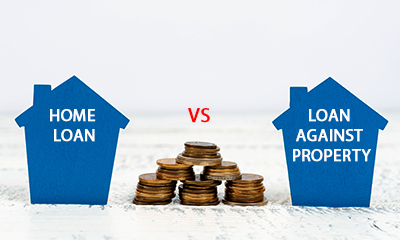Home Loans Without Form 16

Home Loans Without Form 16: What You Need to Know
Form 16 is an important document in the home loan approval process. Form 16 can help your lender verify your income and, thereby, your replacement capacity.
However, there could be situations where you cannot supply your lender with a Form 16. This is especially true for self-employed individuals like freelancers. In such cases, you may be able to apply for a home loan without Form 16. Read on to learn more.
Understanding Home Loan Without Form 16
If you are a salaried employee, you may be familiar with Form 16 while filing income taxes. Companies and employees must grasp the components, eligibility, and importance to ensure tax compliance.
Form 16 allows you to file your income tax returns simply. It is proof that your employer submitted the money that was deducted as TDS from your salary to the authorities. It also explains how your tax was calculated using the investment declarations you made at the beginning of the fiscal year.
Lenders demand paperwork to determine your eligibility and creditworthiness for home loan approval. Form 16 is useful since it gives information about your pay, including bonuses and allowances, and any tax-saving assets you have disclosed to your company.
A home loan without Form 16 could sound challenging, given its importance, but it is not impossible. Some documents may help your case for a home loan without Form 16, especially for non-salaried.
Alternatives to Form 16 for Non-salaried Individuals
If Form 16 is not available for a home loan, salary slips, bank statements, and income tax returns might be used instead.
Salary slips can demonstrate regular income from employment, while bank statements can show recurring deposits from self-employment or other sources. Income tax returns are crucial as they provide a comprehensive overview of an individual's income from various sources, including business, investments, and other avenues.
Additionally, some lenders may request audited financial statements or certified accounts from chartered accountants for self-employed individuals or business owners to validate their income claims.
Eligibility Criteria for Home Loans Without Form 16
Form 16 is frequently required by lenders as part of the documentation process for a home loan application, but it is not the main factor in determining loan approval. Even if you don't have Form 16, you can verify your income and qualify for a house loan in other ways. Below are a few alternatives.
-
If you have submitted your income tax returns for the applicable assessment year, you may offer copies of your ITR acknowledgement as proof of income. Lenders frequently accept ITRs as proof of income stability and tax compliance.
-
Providing salary slips from the previous few months can serve as proof of your regular income. Salary slips often contain information such as basic salary, allowances, and deductions, which lenders use to determine your repayment capacity.
-
Bank statements from the previous six months to a year might assist lenders in assessing your financial health and repayment capabilities. Regular pay credits and other revenue streams on your bank statements can help your loan application.
-
Your loan application can include a letter from your employer detailing your designation, work status, and pay details. Lenders may request this document to verify your work status and income.
-
In some circumstances, particularly for self-employed or those with unpredictable income, acquiring an income certificate from a chartered accountant or a qualified financial advisor might help you prove your income.
-
If you are looking for a home loan to buy a property, you can support your application by supplying necessary papers such as the sale agreement, property appraisal report, and title deeds.
Step-by-Step Guide to Applying for a Home Loan Without Form 16
When applying for a home loan without Form 16, thorough preparation and planning are required beforehand. You should determine your budget, research lenders, and gather alternative income-proof documents.
-
Calculate your total monthly income from all sources. Income proofs like bank statements, ITR acknowledgements, salary slips, rent agreement copies, etc., should demonstrate continuous cashflows for the last six months. If there are any gaps, have a co-applicant with strong income documents.
-
Shortlist lenders based on interest rates offered, processing fees, pre-payment charges, etc. Visit their websites to check eligibility criteria, the loan amount you can get, and documents required.
-
Visit the lender's branch with photocopies of KYC documents (Aadhaar, PAN Card), six months' bank statements, two years' ITRs if available, and alternative proofs like salary slips, rent receipts, business income evidence, etc.
-
Fill out the home loan application form providing personal, income, loan amount and property details. Your credit score, work experience, and relationship with the lender will impact loan eligibility.
-
The bank will verify details through credit checks, CIBIL score, tele verification, technical evaluation of the property, legal status checks, etc. Provide any additional documents requested promptly. Approval times can range from 7 days to a month, depending upon individual profiles.
The key is preparation - evaluate if your overall financial profile can compensate for lack of Form 16, have contingencies for larger down payment if needed, and provide genuine alternative proofs to establish repayment capacity. Be transparent, respond promptly to lender queries, and leverage existing relationships to better your chances.
FAQs
- Can self-employed individuals get a home loan without Form 16?
Yes, self-employed individuals or those without a regular salaried income can still apply for a home loan even if they do not have Form 16. Lenders may accept alternative documents like income tax returns, bank statements, audited financial statements, or income certificates from a chartered accountant as proof of income and repayment capacity.
- How does the interest rate on a home loan without Form 16 compare to a regular home loan?
Lenders may consider home loan applications without Form 16 as higher risk, and therefore, the interest rate charged on such loans could be slightly higher than the rate for regular home loans where Form 16 is provided. The exact difference in interest rates varies across lenders and also depends on the applicant's overall financial profile and creditworthiness.
While Form 16 remains a crucial document for home loan approval, its absence should not deter you from applying for a home loan. Presenting alternative proofs like ITRs, bank statements, and income certificates can help you demonstrate your repayment capacity and financial stability to lenders. Thorough preparation, transparency, and promptness in responding to lender queries can significantly improve your chances of securing a home loan without Form 16. Explore Aadhar Housing's wide range of home loan products and services tailored to meet your specific needs.
- Aadhar Housing Finance has been awarded and recognised as ‘The Best Brand 2021’ at the 4th Edition of ‘The Economic Times – Best Brands 2021’ held at Sahara Star in Mumbai on 21st December, 2021.
- Aadhar Housing Finance was conferred with the 'CSR Times Award 2021' for the successful initiatives implemented under its CSR project, ‘Aayushmaan Aadhar’ at the 8th National CSR E-Summit, on 17th December, 2021.
- Aadhar Housing Finance was conferred with 'India CSR Leadership Award 2021' on 10th Dec, 2021 in 'Community Health' category for its impactful community-centric initiatives conducted under Aayushman Aadhar project.
- Aadhar Housing Finance has received ‘Maharashtra State Best Employer Brand Award, 2021’ at the 16th Employer Branding Awards hosted on 23rd Nov, 2021 by World HRD Congress for our exemplary work in HR. Aadhar has translated and combined vision with action leading to better people strategies and cultivation of competencies in order to enable the organization to be future ready.
- Aadhar Housing Finance Ltd bagged 5 awards across below categories at ‘Banking Frontiers NBFC Awards & Conference 2021’ (DNA Awards 2021) virtual summit held on 20th Aug, 2021. 1) Best Cyber Security Initiative - 1st Prize 2) Best API Initiative - 1st Prize 3) Best Omnichannel CX Initiative - 2nd Prize 4) Best Cloud Initiative - 2nd Prize 5) Esteemed Trophy (IT & Digital Group)
- Awards & Recognition: We received two prestigious awards at the 7th Edition of ‘National Awards For Excellence in BFSI 2021’ which was held virtually on 26th Aug 2021, in mentioned categories: 1) Aadhar Housing Finance Ltd received the ‘Affordable Housing Finance Company of the Year’ award, 2) Shri Deo Shankar Tripathi, MD & CEO, Aadhar Housing Finance Ltd has was conferred with ‘CEO of the Year’ award.
- Awards & Recognition: For the Second consecutive year, Aadhar Housing Finance has been certified as a ‘Great Place To Work’ by Great Place To Work Institute, a Global authority on recognizing high-trust and performance driven culture at workplaces.
- Awards & Recognition: Aadhar Housing Finance is certified as a ‘Great Place To Work’ by Great Place To Work Institute (India). This is a significant milestone for Team Aadhar as ‘The Great Place to Work Model’ is the world’s most researched, accepted and sustainable definition of a great workplace from an employee’s point of view. It is a comprehensive framework encompassing the overall employee experience ecosystem.
- Awards & Recognition: Aadhar Housing Finance won for the 3rd year in a row at The Outlook Money Awards. Team Aadhar received the Silver award in the Affordable Housing category at the Outlook Money Conclave held in Mumbai on 27th Feb, 2020.
- Awards & Recognition: Shri Deo Shankar Tripathi, MD & CEO, Aadhar Housing Finance received the ‘Top Most Influential BFSI Leaders’ award at the World BFSI Congress & Awards, in Mumbai on 14th Feb 2020.
- Awards & Recognition: Shri Deo Shankar Tripathi, MD & CEO, Aadhar Housing Finance received ‘the NBFC Leadership Award 2020’ at the 8th NBFC 100 Tech Summit held in Mumbai by Banking & Finance Post and Elets on 23rd January 2020.
- Awards & Recognition: The Aadhar Annual Report 2018-19 wins all India 3rd Prize in the PRSI National Awards 2019 at the 41st All India Public Relations Conference – Hyderabad
- Awards & Recognition: Aadhar Housing Finance is one of the ‘Best BFSI Brands 2019’: Aadhar Housing Finance received ‘The Economic Times Best BFSI Brands 2019’ award at the India-UAE Strategic Conclave 2019 held in Dubai on 15th October, 2019
- Awards & Recognition: Aadhar Housing Finance received ‘The affordable Home Loan Provider Of The Year 2018’ award from Union Minister Shri Nitin Gadkari at Outlook Money Conclave in Mumbai on 12th March, 2019 for the exemplary work in supporting the ‘Housing for All’ mission in India.
- Aadhar Housing Finance received the Prestigious ‘PMAY Empowering India Award 2019’ from Union Minister Shri Hardeep Singh Puri in Delhi on 5th March, 2019 for its exemplary work in supporting the ‘Housing for All’ mission in India.
- Dun & Bradstreet included Aadhar Housing Finance in 'India's Leading BFSI Companies 2019' list. The report was published by Dun & Bradstreet Information Services in March, 2019.
- Aadhar is declared one of the 1) ‘DREAM COMPANIES TO WORK FOR’ (Financial Services) and 2) ‘DREAM EMPLOYER OF THE YEAR’ presented by ET Now on 16th Feb, 2019 at the World HRD Congress in Mumbai.
- Shri Deo Shankar Tripathi, MD & CEO, Aadhar Housing Finance was recognized and felicitated as one of ‘100 Top Most Influential BFSI Leaders’ at the ‘World BFSI Congress’ held in Mumbai on 14th Feb, 2019.
- Aadhar Housing Finance bagged the ‘Most Promising Brand For Housing Finance’ award at the ‘World BFSI Congress’ presented by ET Now in Mumbai on 14th Feb, 2019.
- Aadhar Housing Finance won ‘Prestigious Brands of India 2019’ award at the conference held at Sahara Hotel in Mumbai on 12th Feb, 2019. The list of prestigious brands was judged and presented by BARC (Brand Advertising Research and Consulting), a global brand consultancy firm and ERTC Media, one of India’s leading independent media consulting & brand listing organisations. The recognition solidifies Aadhar as a leader within housing finance segment across various parameters such as brand recall, impact, trust, positioning, growth, reach, and innovation.
- Aadhar Housing Finance won the prestigious Finnoviti 2019 award at ‘Finnoviti Awards & Conference’ presented by Banking Frontiers and their Knowledge Partner Deloitte in Mumbai on 25th January, 2019 for innovative distribution and referral model named ‘Aadhar Mitra’.
- Aadhar Housing Finance bagged 2 prestigious awards at the ‘Banking, Financial Services & Insurance Awards’ presented by ABP News in Mumbai on 28th November, 2018:
- Housing Finance Company of the Year (Medium and Small) – for our exemplary work in the affordable housing finance segment.
- Marketing Campaign of the Year – for our recent brand campaign #GharBanegaTohDeshBanega.
- Aadhar MD & CEO awarded the ‘BFSI Leadership Award’ in Nov 2018 by ‘The Banking and Finance’ magazine and ‘elets’.
- Aadhar MD & CEO awarded the ‘Certificate of Excellence’ under “30 most innovative Business Leaders to watch in 2018” in July 2018 by ‘The CEO Magazine’.
- Aadhar receives the Award as the “Best Affordable Home Loan Provider of the Year 2017” at the ‘Outlook Money Awards’ March 2018.
- Aadhar CEO receives the ‘Inclusive Business Leaders Award’ from International Finance Corporation (IFC) for Aadhar’s exemplary work in Inclusive Business at the 2012 Inclusive Business Leaders Forum in Tokyo, Japan.
Report











